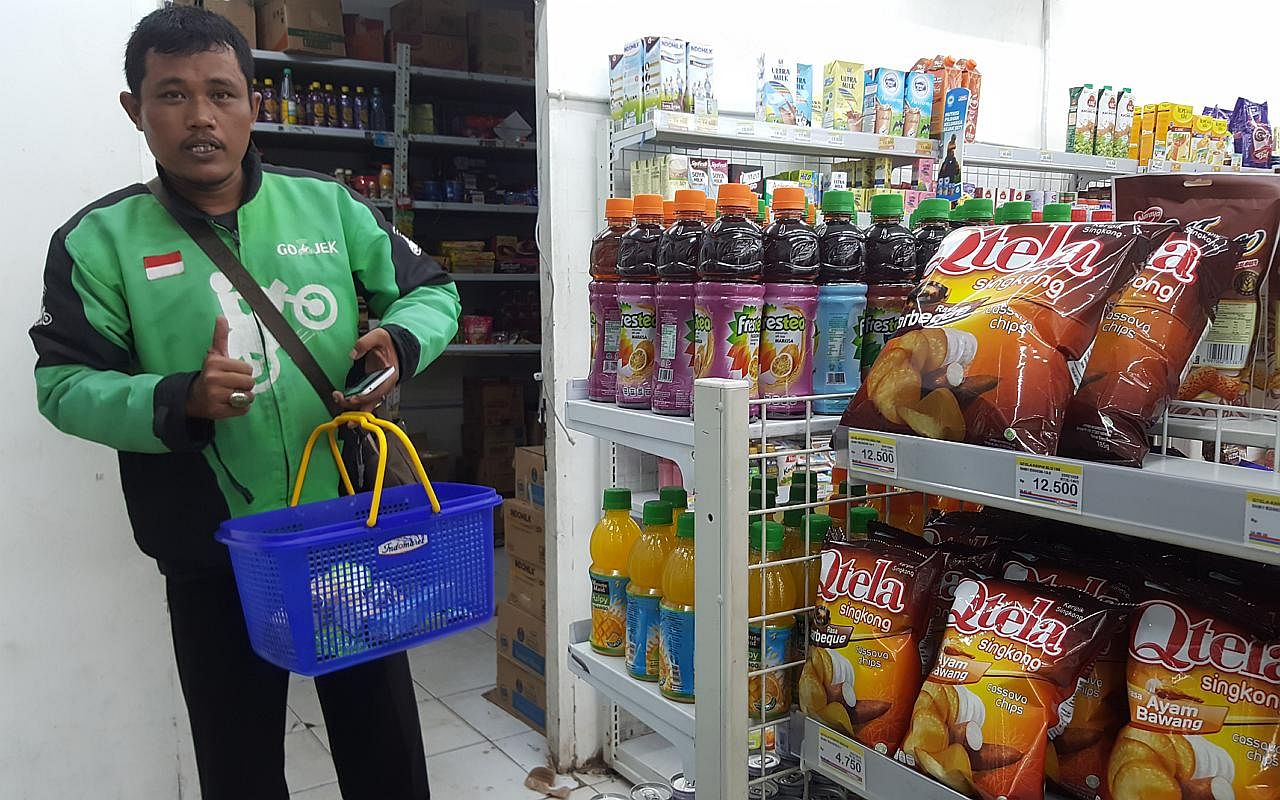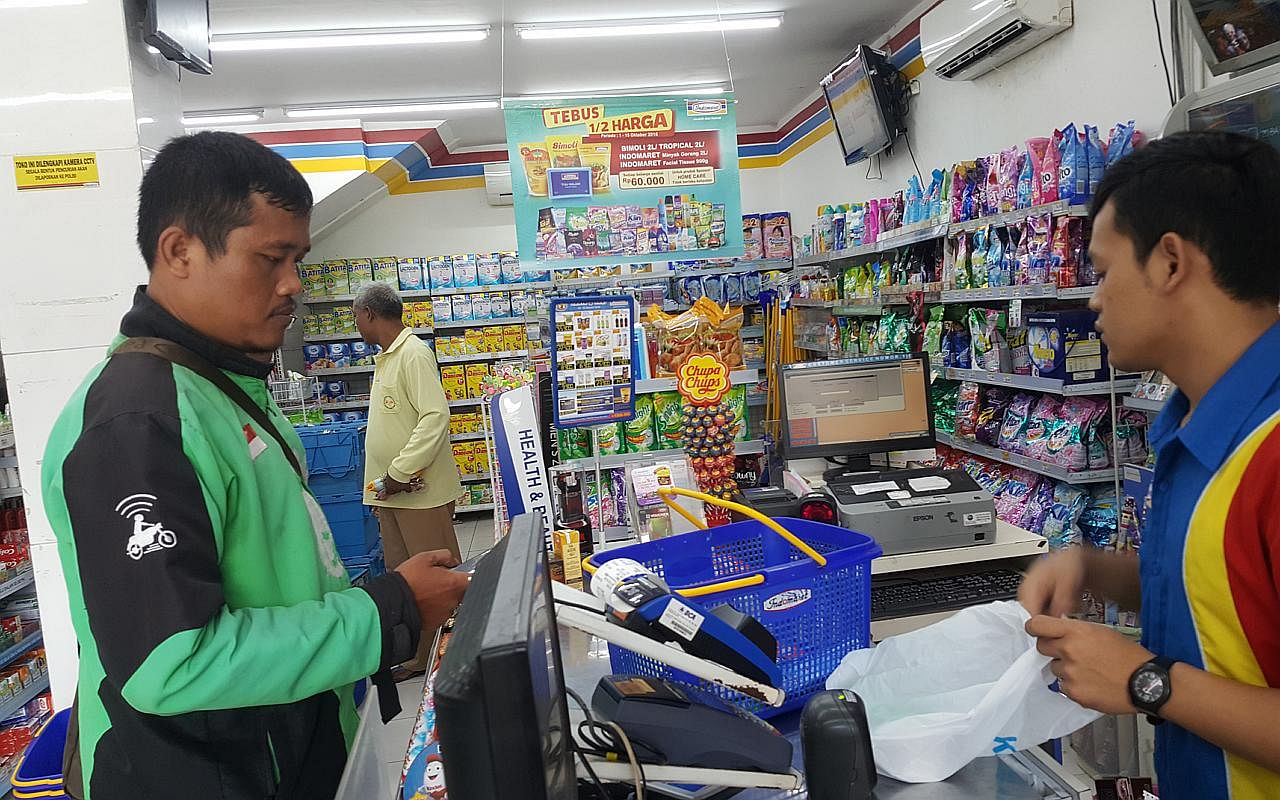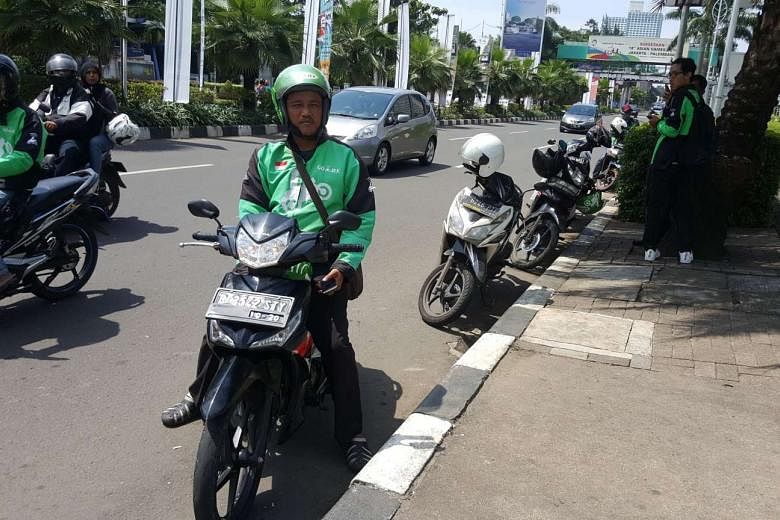JAKARTA - Indonesian motorcycle-taxi driver David hid behind some tall shelves at a Jakarta supermarket, his hands tightly clutching a pack of sanitary pads.
His face turned redder as the queue of women waiting to pay at the cashier got longer. He left for a smoke to de-stress before returning to finish the dreadful task.
"Aduh, I was really embarrassed. The female cashier kept smiling," the 36-year-old told The Straits Times. "All these women's things... so much variety, wing, no wing, I'm clueless. When I call my wife for help, she laughs," he said.
Mr David is a "Tukang Ojek Online", a motorcycle-taxi driver hired by ride-hailing app-based companies such as Go-Jek to give clients rides, make deliveries to their home, and shop for food and groceries.
Last Sunday, I "booked" Mr David to shop for groceries, and asked to tag along for fun. He was surprised, but obliged.
We went to Indomaret minimart to buy coffee, toothpaste, laundry soap and Tolak Angin jamu.
"I really dislike shopping. It is time-consuming," he said, bending and squatting to look for the elusive coffee. "I simply match pictures to the products or ask the shop assistants to find them for me."
Fifteen minutes later, the shopping was done and ready to be delivered to my home. All that effort for 12,000 rupiah (S$1.30).

Indeed, it has literally been a whirlwind ride, he said.
OF FAINTING CLIENTS, PET CAGES AND DRUG MAFIAS
What could be worse than giving rides to passengers who compromise safety by squeezing themselves and their children on the cramped seat or those who sit too far back that the motorcycle risks tipping over backward? Well, fainting passengers.
"A woman suddenly collapsed on my back, apparently she had acute gastric attack. I totally panicked," he said.
He frantically searched through her phone contacts to call her relatives, and summoned his own to drive her to a clinic. She eventually came to, but uttered no word of thank-you, he said.
-
About Go-Jek
-
Founded in 2010, Go-Jek has been branching into other areas in recent years, such as courier services, massages, food delivery, grocery shopping and house-cleaning services.
Late last month, it reportedly acquired Bangalore-based healthcare startup Pianta, which links people to healthcare providers who make house visits.
The company processed more than 20 million bookings in June, or roughly eight bookings per second, Tech in Asia quoted the company as saying in a July report.
Go-Jek's growing might has forced some of its business rivals to close. Food delivery startup Foodpanda pulled out of Indonesia earlier this month (October) after four years, reportedly due to stiff competition. Unlike Foodpanda's close-range delivery service, Go-Jek riders are able to travel anywhere to buy food, for a mere dollar or two.
Transporting things could be just as challenging, he learnt. Things like a 100kg refrigerator. Or drugs.
His colleague ran into trouble once when police found crystal meth in the box he was delivering.
"He had to tell them repeatedly he was an innocent courier. He was so traumatised he quit," Mr David said.
"Drug mafias often use us to send drugs. They then use a traffic app to track where we are. If we are stopped by police, they will pack up and go," he added.
His job often demands creative solutions to problems. He once had to deliver a giant dog cage, which was clearly too big for his motorcycle.
"I was wracking my head for a long time. In the end, I tied pieces of rope to the cage bars and carried it like a backpack," he said.
But the most hated task is delivering food, which is a lot of hassle for little returns. After paying parking fees and phone credit, he pockets a mere 6,000 rupiah.
"I have to queue, order the food, wait for it to be cooked. And then customers can be fussy so I have to make many calls to check so I don't get the order wrong," he said.
Negotiating the roads in a country notorious for its traffic jams can be frustrating, but being a "tukang ojek" has given Mr David the "freedom and adventure" he always wanted. The father of a six-year-old girl quit his security guard job of two decades last year so he could spend more time with his family.

Occasionally, he meets kind passengers who make the job worthwhile. He recalled a customer who cheered him up when he was having a bad day. The woman worked with patients with infectious diseases so she could not mingle freely with others for fear of infecting them.
"Her job is tougher. She said we must serve people with our hearts, not because of money. That advice has stayed with me until today."


